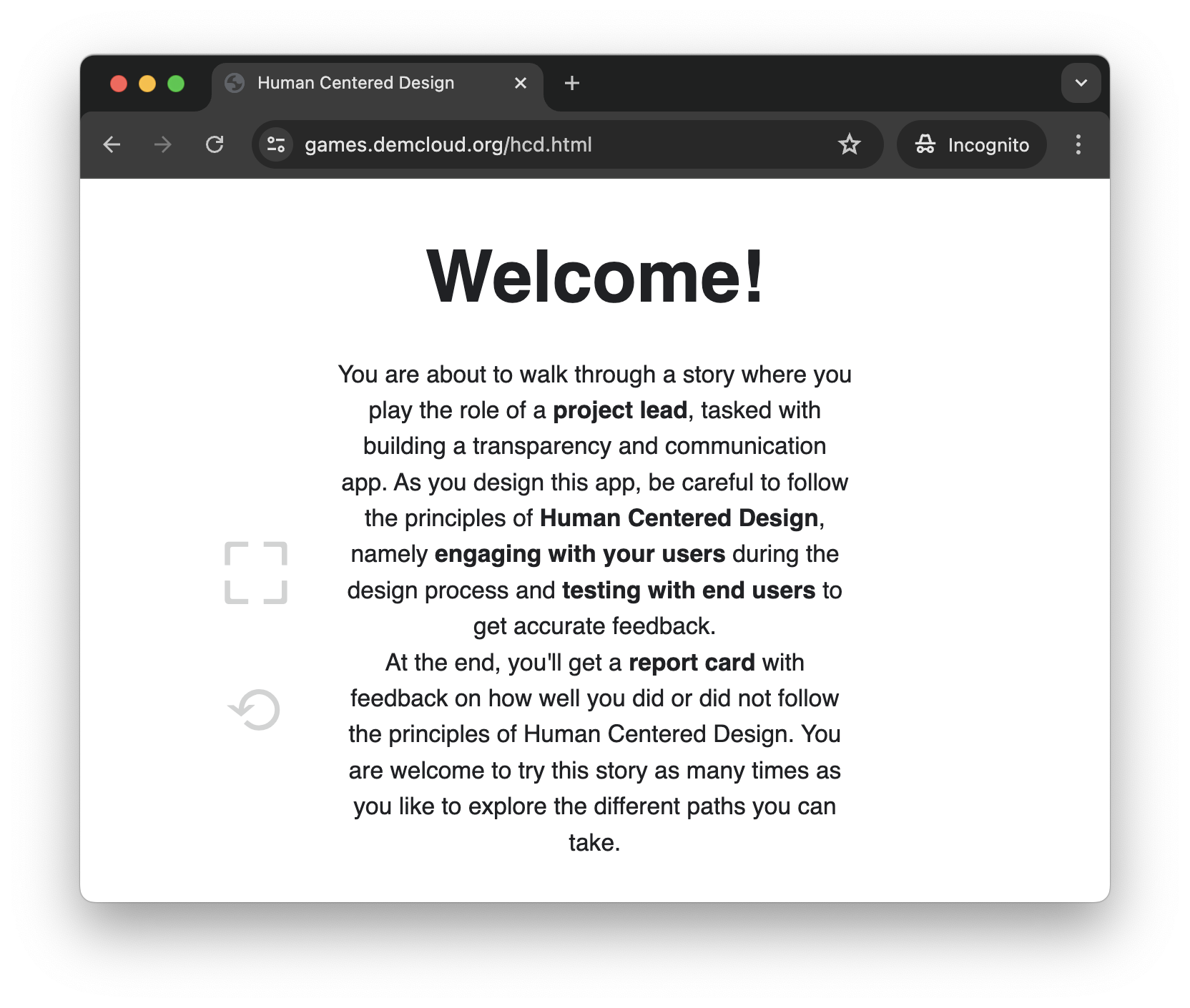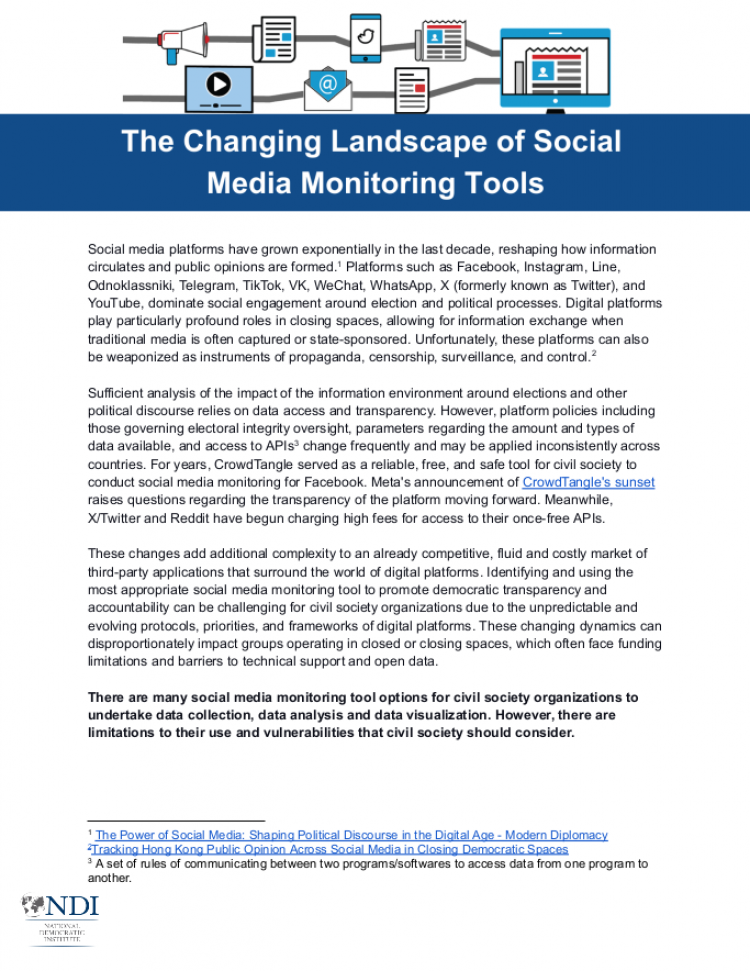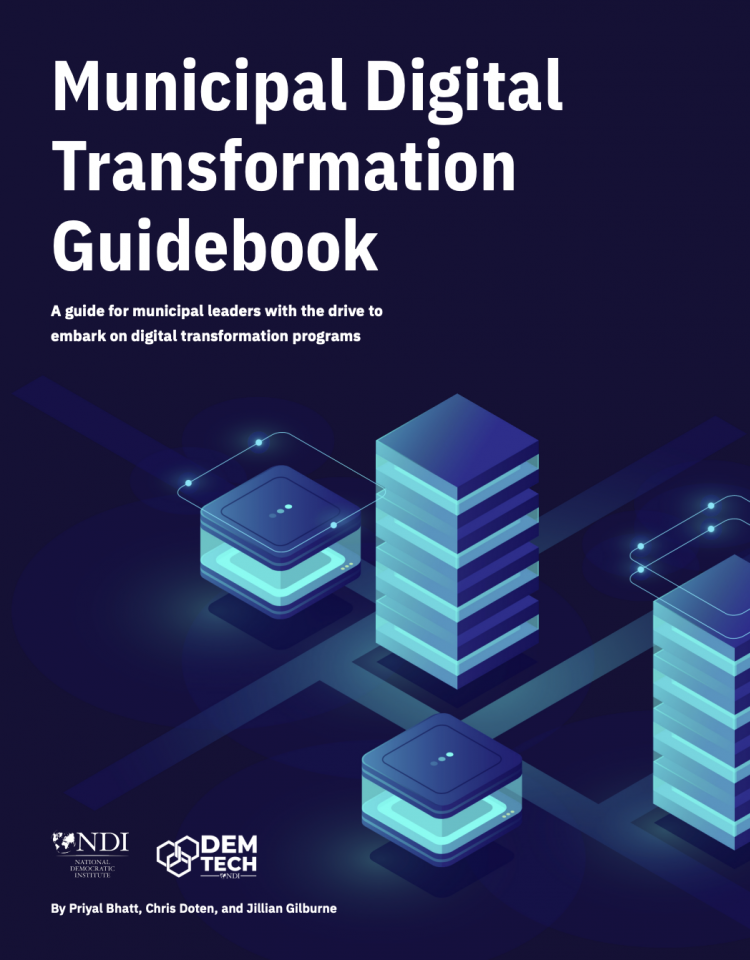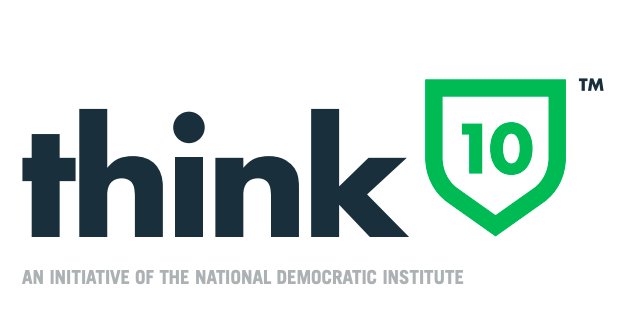Use the keyword search and filters to find recommended guides that fit your needs. You can also use the advanced search for more filtering options.
Technology Guides

Human Centered Design for Democracy Game
NDI’s DemTech team developed a game called “Human-Centered Design for Democracy” to teach the principles of human-centered design (HCD) in the context of democratic development. This interactive game guides players through the process of designing and implementing community projects that are inclusive, effective, sustainable, and user centered.

The Changing Landscape of Social Media Monitoring Tools
A guide to understanding the social media monitoring tool options for civil society organizations to undertake data collection, data analysis and data visualization, as well as limitations to their use and vulnerabilities.

Municipal Digital Transformation Guidebook
Integrating technology can be a positive for local government, boosting citizen engagement, reducing corruption, speeding service delivery, and cutting costs. However, most projects fail – and too many facilitate repression. This guidebook is designed for political leaders and project managers to navigate the goals of modernizing the public sector while supporting democracy and human rights.

People Powered Guide to Digital Participation Platforms
Interested in the world of participatory budgeting and or other forms of participatory democracy? PeoplePowered.org has a large repository of papers, guides, tools and information focused on ways that citizens can directly engage with government processes.

Online Course- Cybersecurity Basics for Democracy Activists
As someone who stands up for democracy, you are likely to find yourself –- if you haven't yet already –- the target of a cybersecurity attack. This is not intended to be alarmist; it is reality these days, even for individuals that do not consider themselves to be particular targets. The good thing is that you do not need to become a coder or a tech whiz to defend yourself against common threats. But you do need to be prepared to invest some effort, energy, and time in developing some defenses. Without doing this - and the odds are stacked against you.
This course was developed to help get you started in preparing those defenses. Digital security and the concepts associated with it can be intimidating and overwhelming, so we have designed this course to use simple language, cover the most essential, foundational concepts, and connect with existing resources to avoid reinventing the wheel. Before we begin, please note that this course is intended to be just a starting point on your security journey. While we'll cover a lot of important ground, keep in mind that - especially if you are working in a high risk environment - there are many other specific topics you'll want to consider as well. So in addition to completing this course - and sharing all these best practices with others in your network - we strongly encourage you to conduct your own personal risk assessment and connect with trusted cybersecurity experts and resources for more advanced support. This can include the resources recommended throughout this course and in NDI's Cybersecurity Handbooks for Civil Society Organizations, Political Parties, or Parliaments.

think10
The #think10 safety planning tool provides women in politics guidance on how to enhance their personal security by combining scores from a self-assessment questionnaire and the country score from NDI’s new Women’s Political Participation Risk Index. The WPPRI calculates the risk to politically active women in 172 countries. In using the tool, women in politics can develop a safety plan relevant to their personal and professional profile, and in their political context. Each country’s ranking in the WPPRI is built from three indicators: the level of women’s political participation at the national level; the state of democracy in each country; and the likelihood of violence that women in that country face. NDI has based these indicators on data gained from the Inter-Parliamentary Union, the Economist Intelligence Unit, and Georgetown University’s Institute of Women Peace and Security.

Building Trust in Democracy: The Potential of Blockchain
This white paper examines blockchain technology's potential application to supporting democracy, improving government service delivery, fighting corruption, and demonstrating the integrity of elections and political processes.

Data Analytics for Social Media Monitoring
This guide is designed to help democracy practitioners better understand social media trends, content, data, and networks. By sharing lessons learned and best practices from across our global network, the guide empowers monitors to make democracy work online by helping them:
• Collaborate with local, national, or international partners;
• Understand different methods of data collection;
• Make the best use of mapping and data visualization;
• Analyze the online ecosystem;
• Detect malicious or manipulated content and its source;
• Understand available tools for all aspects of social media monitoring; and
• Know how to respond with data, methods, research, and more through social media.
Combatting Information Manipulation Playbook
A playbook for CSOs to identify, respond, and build resilience to info manipulation developed with IRI and the Stanford Internet Observatory. The playbook is intended to help leapfrog the first six months of the electoral preparation process and enable societies to effectively push back against efforts undermining free and fair elections, supporting democratic processes and rights more broadly.

5G and the Future Internet: Implications for Developing Democracies and Human Rights
5G adoption is happening around the world, even in places with low internet penetration. As of February 2021, 131 countries had announced plans to invest in 5G and more than 60 of the 98 countries NDI works in were engaging corporations that have close ties to the Chinese Communist Party (CCP) in their 5G plans. Existing research on 5G has focused almost exclusively on its impacts for international security and economic growth. Little is understood in the democracy donor community about the paths to 5G for developing democracies, how players in the 5G rollout process interact with democratic actors in a given country, or where there are strategic points of intervention to defend democracies from illiberal influences and technology standards. NDI set out to address this gap of comprehensive research into the impacts, positive or negative, of 5G on human rights and democracy through NDI's new white paper, 5G and the Future Internet: Implications for Developing Democracies and Human Rights.
